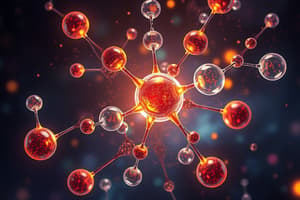Podcast
Questions and Answers
What is the primary focus of organic chemistry?
What is the primary focus of organic chemistry?
- Compounds containing oxygen atoms
- Compounds containing nitrogen atoms
- Compounds containing hydrogen atoms
- Compounds containing carbon atoms (correct)
Which type of compounds consist only of carbon and hydrogen?
Which type of compounds consist only of carbon and hydrogen?
- Ethers
- Carboxylic acids
- Hydrocarbons (correct)
- Alcohols
How are hydrocarbons classified based on their molecular structure?
How are hydrocarbons classified based on their molecular structure?
- Alkanes, alkenes, aromatic molecules (correct)
- Ethers, amines, esters
- Alkanes, alcohols, carboxylic acids
- Alkenes, alcohols, amines
What are enantiomers in organic chemistry?
What are enantiomers in organic chemistry?
Which stereoisomers have different nonenantiomorphic chiral centers?
Which stereoisomers have different nonenantiomorphic chiral centers?
Why is understanding stereochemistry important in organic chemistry?
Why is understanding stereochemistry important in organic chemistry?
What is one of the most interesting aspects of organic chemistry?
What is one of the most interesting aspects of organic chemistry?
Why is learning nomenclature systems essential in organic chemistry?
Why is learning nomenclature systems essential in organic chemistry?
What do synthetic strategies and methodologies offer insight into?
What do synthetic strategies and methodologies offer insight into?
Why is acquiring proficiency in predicting product formations important in organic chemistry?
Why is acquiring proficiency in predicting product formations important in organic chemistry?
What does IUPAC nomenclature use to classify compound categories?
What does IUPAC nomenclature use to classify compound categories?
Why do students need to comprehend synthetic strategies in organic chemistry?
Why do students need to comprehend synthetic strategies in organic chemistry?
Study Notes
Exploring Organic Chemistry for CBSE Class 11
Organic chemistry is a branch of science that focuses primarily on compounds containing carbon atoms. It's an intriguing field with countless applications across various industries such as pharmaceuticals, plastics, textiles, and more. In this exploration into organic chemistry specifically tailored for CBSE Class 11 students, we will delve into fundamental concepts, reactions, and techniques with the goal of setting a foundation for further study.
The Carbon Backbone
Carbon has the unique ability to form multiple covalent bonds due to its valency of four. This characteristic allows it to build complicated structures known as hydrocarbons – compounds consisting only of carbon and hydrogen. Hydrocarbons can be classified according to their molecular structure, such as alkanes, alkenes, and aromatic molecules. These classes serve as building blocks for other organic compounds like alcohols, ethers, amines, carboxylic acids, esters, and many others.
Stereochemistry
Stereoisomers, also called stereoisomeric forms, exist when identical constituents arrange themselves differently within space. Two main types of stereoisomers present in organic chemistry are enantiomers (nonsuperimposable mirror images) and diastereomers (different nonenantiomorphic chiral centers). Understanding these structural variations is vital because they influence physical properties and biological activity.
Reaction Mechanisms
One of the most interesting aspects of organic chemistry involves elucidating reaction mechanisms. By deciphering the steps involved in chemical transformations, chemists understand how reactants interact in order to form products. Some common reaction types include substitution, elimination, addition, and rearrangement processes. Acquiring proficiency in predicting product formation based on reaction types helps immensely while solving problems related to synthetic routes applied in natural product synthesis, drug design, and material sciences.
Naming Conventions
Learning nomenclature systems is essential in organic chemistry since names help identify specific functional groups and orientations among different molecules. For example, IUPAC nomenclature uses prefixes and suffixes to classify compound categories and to indicate specific functional groups respectively. Knowledge of naming conventions improves communication between scientists and assures accurate understanding and identification of chemicals during experiments and discussions.
Synthetic Strategies and Methodologies
As students progress through organic chemistry courses, they learn valuable synthetic strategies and methodologies used by experts to plan and execute complex chemical procedures. Learning about these techniques is crucial, as they offer insight into the principles underlying organic synthesis, which is the fabrication of new substances from readily available starting materials. Comprehending these approaches enables students to solve challenging problems and develop innovative solutions to create novel and useful organic compounds.
Studying That Suits You
Use AI to generate personalized quizzes and flashcards to suit your learning preferences.
Description
Explore the basics of organic chemistry tailored for CBSE Class 11 students, covering the carbon backbone, stereochemistry, reaction mechanisms, naming conventions, and synthetic strategies. Enhance your understanding of fundamental concepts, reactions, and techniques in this intriguing field of science.




